外研版(2019)必修第三册Unit2 Making a Difference Developing ideas P20-23课件(共43张PPT)
文档属性
| 名称 | 外研版(2019)必修第三册Unit2 Making a Difference Developing ideas P20-23课件(共43张PPT) | 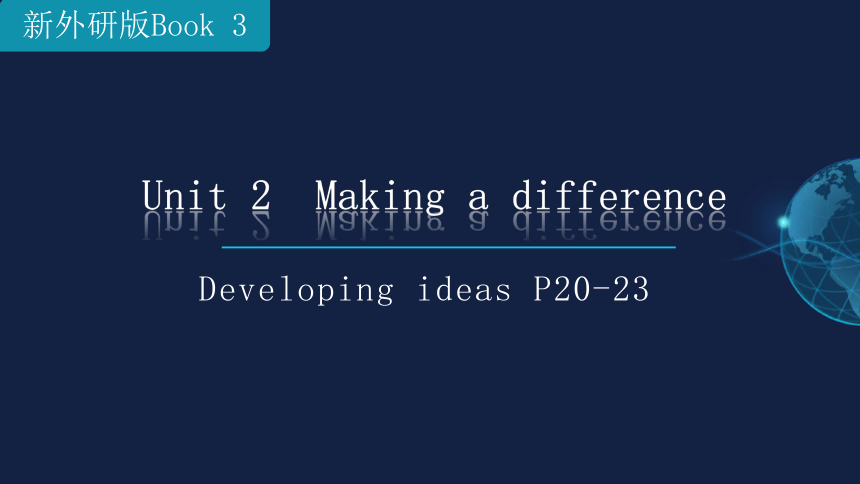 | |
| 格式 | pptx | ||
| 文件大小 | 11.3MB | ||
| 资源类型 | 教案 | ||
| 版本资源 | 外研版(2019) | ||
| 科目 | 英语 | ||
| 更新时间 | 2024-07-21 21:58:40 | ||
图片预览

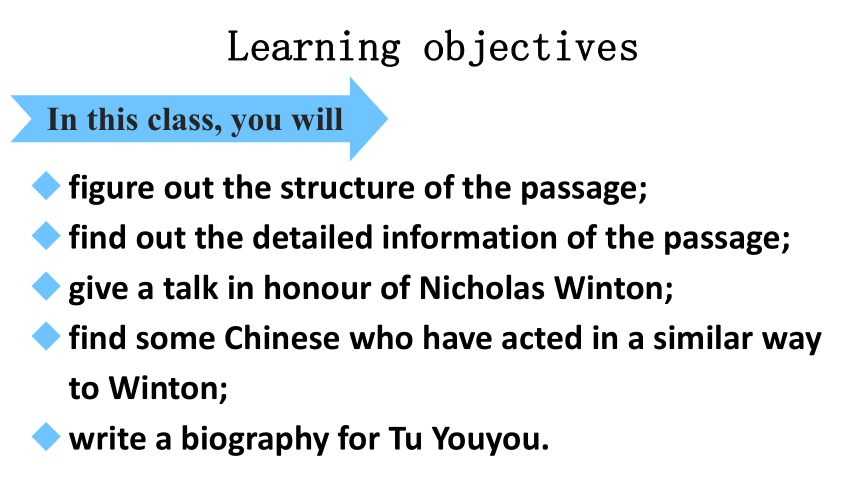
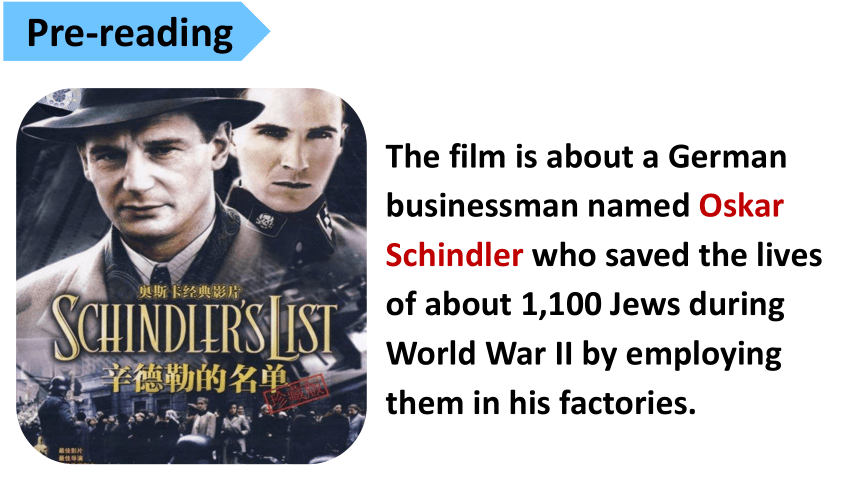
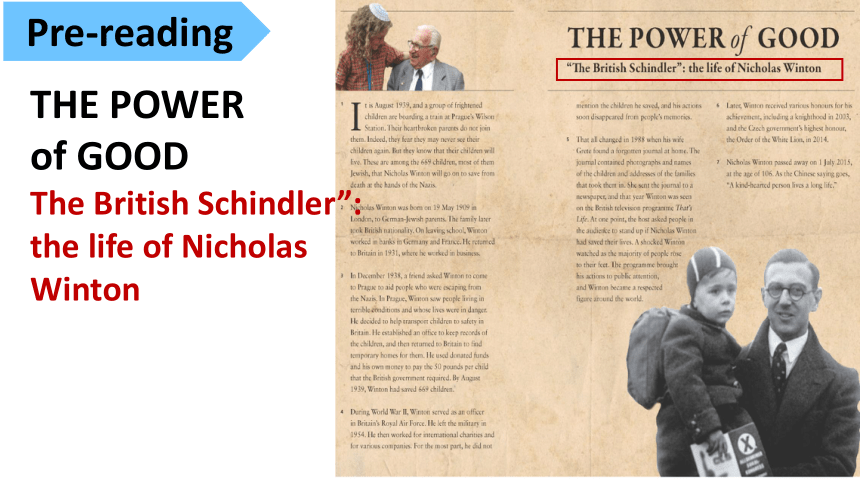
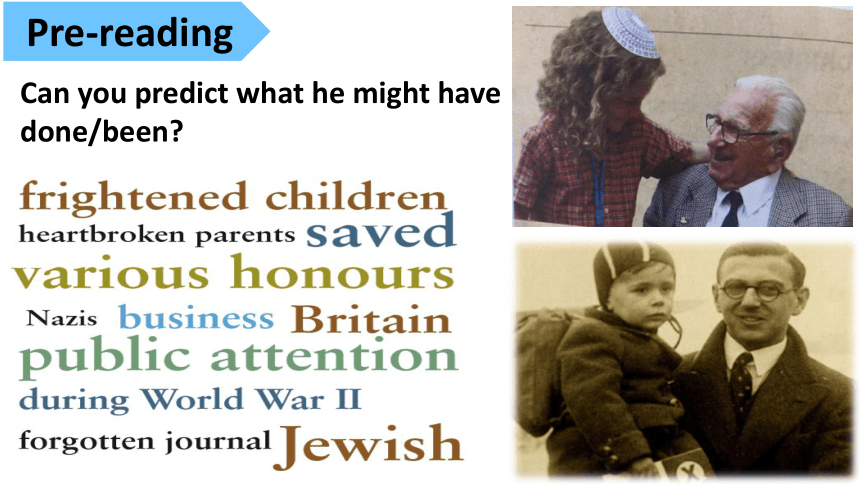

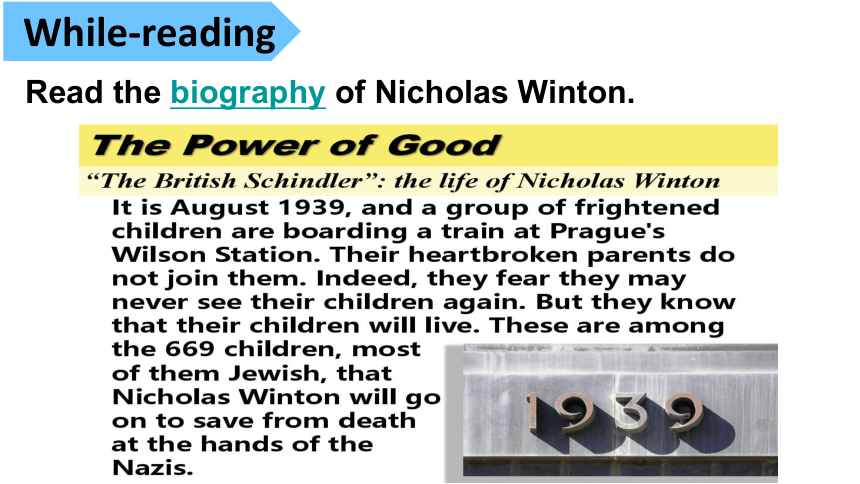
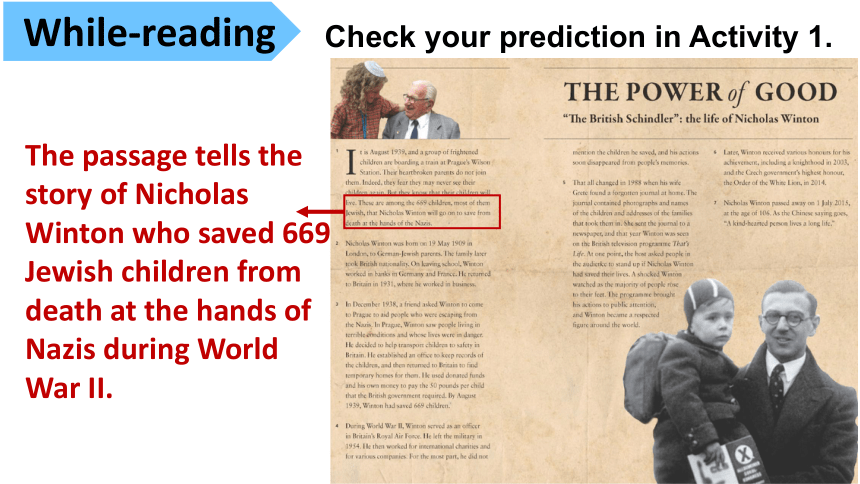
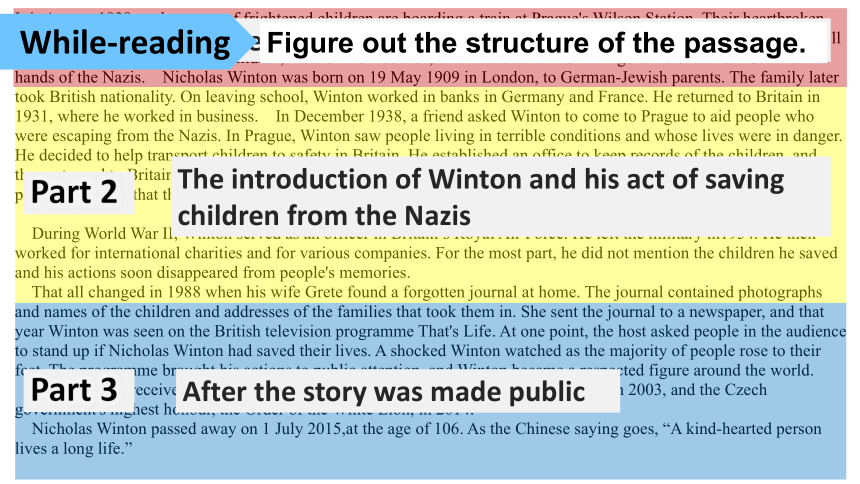
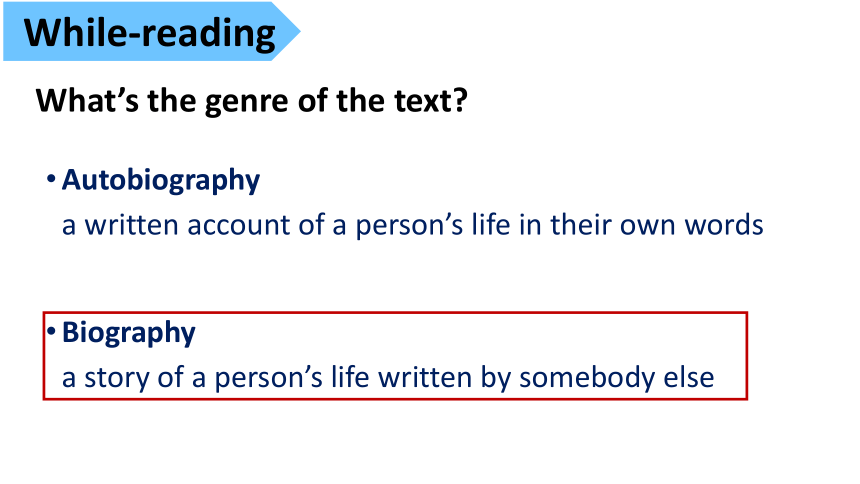
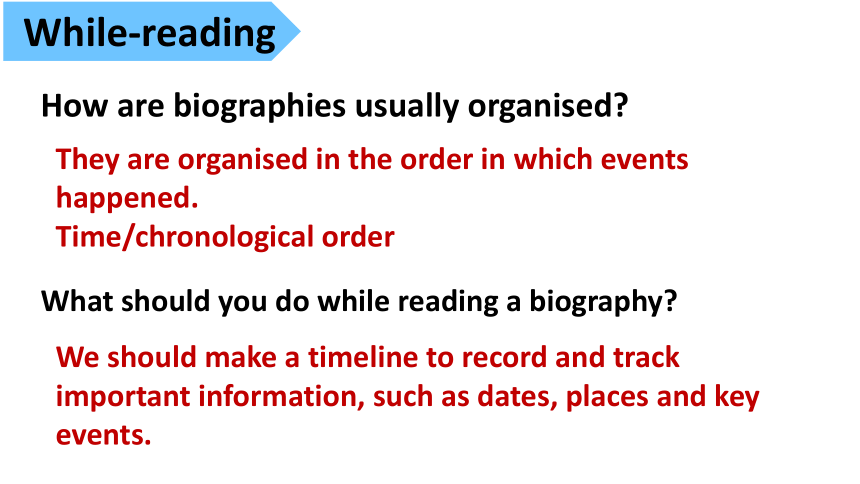
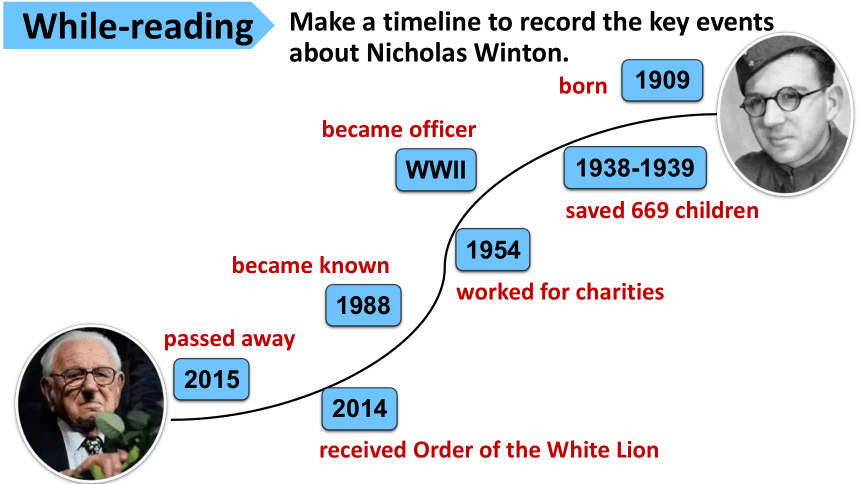
文档简介
(共43张PPT)
Developing ideas P20-23
Unit 2 Making a difference
新外研版Book 3
Learning objectives
In this class, you will
figure out the structure of the passage;
find out the detailed information of the passage;
give a talk in honour of Nicholas Winton;
find some Chinese who have acted in a similar way to Winton;
write a biography for Tu Youyou.
Pre-reading
The film is about a German businessman named Oskar Schindler who saved the lives of about 1,100 Jews during World War II by employing them in his factories.
THE POWER
of GOOD
The British Schindler”: the life of Nicholas Winton
Pre-reading
Pre-reading
Can you predict what he might have done/been
Pre-reading
Can you predict what he might have done/been
He might have saved frightened Jewish children whose parents were heartbroken , from the Nazis during World War II and he might have received various honours.
Read the biography of Nicholas Winton.
While-reading
Check your prediction in Activity 1.
While-reading
The passage tells the story of Nicholas Winton who saved 669 Jewish children from death at the hands of Nazis during World War II.
It is August 1939, and a group of frightened children are boarding a train at Prague's Wilson Station. Their heartbroken parents do not join them. Indeed, they fear they may never see their children again. But they know that their children will live. These are among the 669 children, most of them Jewish, that Nicholas Winton will go on to save from death at the hands of the Nazis. Nicholas Winton was born on 19 May 1909 in London, to German-Jewish parents. The family later took British nationality. On leaving school, Winton worked in banks in Germany and France. He returned to Britain in 1931, where he worked in business. In December 1938, a friend asked Winton to come to Prague to aid people who were escaping from the Nazis. In Prague, Winton saw people living in terrible conditions and whose lives were in danger. He decided to help transport children to safety in Britain. He established an office to keep records of the children, and then returned to Britain to find temporary homes for them. He used donated funds and his own money to pay the 50 pounds per child that the British government required. By August 1939, Winton had saved 669 children.
During World War II, Winton served as an officer in Britain’s Royal Air Force. He left the military in1954. He then worked for international charities and for various companies. For the most part, he did not mention the children he saved and his actions soon disappeared from people's memories.
That all changed in 1988 when his wife Grete found a forgotten journal at home. The journal contained photographs and names of the children and addresses of the families that took them in. She sent the journal to a newspaper, and that year Winton was seen on the British television programme That's Life. At one point, the host asked people in the audience to stand up if Nicholas Winton had saved their lives. A shocked Winton watched as the majority of people rose to their feet. The programme brought his actions to public attention, and Winton became a respected figure around the world.
Later, Winton received various honours for his achievement, including a knighthood in 2003, and the Czech government's highest honour, the Order of the White Lion, in 2014.
Nicholas Winton passed away on 1 July 2015,at the age of 106. As the Chinese saying goes, “A kind-hearted person lives a long life.”
Part 1
Part 2
Part 3
The heartbreaking scene at Prague’s Wilson Station
The introduction of Winton and his act of saving children from the Nazis
After the story was made public
While-reading
Figure out the structure of the passage.
While-reading
What’s the genre of the text
Autobiography
a written account of a person’s life in their own words
Biography
a story of a person’s life written by somebody else
While-reading
How are biographies usually organised
They are organised in the order in which events happened.
Time/chronological order
What should you do while reading a biography
We should make a timeline to record and track important information, such as dates, places and key events.
While-reading
Make a timeline to record the key events about Nicholas Winton.
1988
1909
1938-1939
2014
2015
WWII
1954
saved 669 children
became known
became officer
worked for charities
born
received Order of the White Lion
passed away
While-reading
Does the writer tell the story in time order Why
1988
1909
1938-1939
2014
2015
WWII
1954
saved 669 children
became known
became officer
worked for charities
born
received Order of the White Lion
passed away
While-reading
Read for details.
What’s the function of para 1
Flashback 倒叙
To engage the readers/arouse their interest;
To emphasise the result/ importance of the event.
While-reading
Read for details.
Why did Winton save the children
In December 1938, a friend asked Winton to come to Prague to aid people who were escaping from the Nazis. In Prague, Winton saw people living in terrible conditions and whose lives were in danger. He decided to help transport children to safety in Britain. He established an office to keep records of the children, and then returned to Britain to find temporary homes for them. He used donated funds and his own money to pay the 50 pounds per child that the British government required. By August 1939, Winton had saved 669 children.
While-reading
Read for details.
What difficulties did Winton meet
collecting money
keeping records of the children
finding homes for the children
getting permits from the government
eluding (躲避) the Nazis
While-reading
Read for details.
Why do you think it took such a long time for Winton’s actions to become known
1988
1938-1939
saved 669 children
became known
50 years
While-reading
Read for details.
Describe Winton’s personal qualities with key actions to support your answers.
1988
1938-1939
saved 669 children
became known
50 years
modest/ selfless
While-reading
Read for details.
Describe Winton’s personal qualities with key actions to support your answers.
1988
1909
1938-1939
2014
2015
WWII
1954
saved 669 children
worked for charities
affectionate/warmhearted
kind/affectionate/ sympathetic/ compassionate/selfless
While-reading
Read for details.
Describe Winton’s personal qualities with key actions to support your answers.
1988
1909
1938-1939
2014
2015
WWII
1954
saved 669 children
worked for charities
affectionate/warmhearted
kind/affectionate/ sympathetic/ compassionate/selfless
became known
became officer
brave/courageous
modest/selfless
Post-reading
Suppose you were one of the persons saved by Winton, please give a talk in honour of Nicholas Winton at the memorial service when he passed away.
Talk about Winton’s key actions.
Talk about Winton’s personal qualities.
End with the main reasons why he inspires you.
Post-reading
1988
1909
1938-1939
2014
2015
WWII
1954
saved 669 children
worked for charities
affectionate/warmhearted
kind/affectionate/ sympathetic/ compassionate/selfless
became known
became officer
brave/courageous
modest/selfless
born
received Order of the White Lion
passed away
Talk about Winton’s key actions.
Talk about Winton’s personal qualities.
End with the main reasons why he inspires you.
Post-reading
Search the internet to find some Chinese who have acted in a similar way to Winton.
Make a timeline to record dates and key actions.
Talk about their personal qualities.
Analyse what the power of good is.
One example:
Ho Fengshan (何凤山): The “Chinese Schindler” who saved thousands of Jews
Writing
What is biography
A biography, or simply bio, is a detailed description of a person's life. It involves more than just the basic facts like education, work, relationships, and death; it describes a person's experience of these life events.
Writing
How to write a biography
structure
Introduction
Main body
Conclusion
Writing
Read Tu Youyou’s CV and fill in the boxes with the corresponding information.
Writing
Introduction
Name of the person: ___________
Her biggest achievement:
__________________________________________________________________________________________
Tu Youyou
She managed to extract qinghaosu, which is very effective in fighting malaria.
Writing
Main Body
Major events (in time order):
__________________________________________________________________________________________________________________________________________________________________________________________
From 1951 to 1955, she studied at Beijing Medical College (now Peking University Health Science Centre).
Since 1955, she has worked at China Academy of Chinese Medical Sciences, as a tenured and chief researcher.
Writing
Main Body
Major events (in time order):
__________________________________________________________________________________________________________________________________________________________________________________________
In 1972, she managed to extract qinghaosu from a Chinese herb, which is very effective in fighting malaria.
In 1969, she worked as the leader of a research team aiming to discover a treatment for malaria.
Writing
Main Body
Major events (in time order):
_____________________________________________________________________________________________
_______________________________
_______________________________
_______________________________
In 1986, she obtained a New Drug Certificate for qinghaosu, issued by the Ministry of Health of China.
In 2015, she won the Nobel Prize in Physiology or Medicine for discovering a novel therapy against malaria.
Writing
Main Body
Major events (in time order):
_____________________________________________________________________________________________
In 2019, she was nominated for “The Greatest Person of the 20th Century”.
Conclusion
Your opinion on her contribution:
__________________________________________
Writing
Now write a biography for Tu Youyou. Use the expressions in the box to help you. Do further research if necessary.
In (year), ... On (day/date), ...
Later, ... Finally, ...
At the age of ... At one point, ...
By (year/day/date), ...
Useful expressions
Writing
Use the checklist to give feedback on your partner’s draft.
□ Does the biography include the key points
□ Is the biography organized properly and
smoothly
□ How is the language
□ How is the handwriting
□ How is the paper design
Unit 2 Making a difference
新外研版Book 3
Language points P20-21
课文回顾:
1
He returned to Britain in 1931, where he worked in business.
关系副词where在非限制性定语从句中作地点状语,指代主句中的Britain。
【句法分析】where引导非限制性定语从句
句意:1931年,他回到英国,从事商业工作。
where引导的定语从句和地点状语从句的区别
①where引导定语从句:where在从句中作地点状语, 主句中有表示地点的先行词, where引导的从句修饰先行词。
②where引导状语从句:where引导的从句修饰主句的谓语动词, where前面无表示地点的先行词。
例:
1. The bookshop where I bought this book
is not far from here.
2. This is the house where I lived two years
ago.
例:
Make a mark where you have any doubts or questions.
2. I found my books where I had left them.
句意:他开设了一个办事处,记录孩子们的信息,然后回到英国为他们寻找寄养家庭。
establish v.建立,创立;确立
例:我们已经与那个博物馆建立了联系。
We had already ____________________________.
2
He established an office to keep records of the children, and then returned to Britain to find temporary homes for them.
established contact with the museum.
【辨析】 build/ found/ establish/ set up
build 修建、建筑,常跟house,road,bridge,hope等;
establish 建立机构、组织或联系;
found 主要用于创立机构、组织或理论;
set up 口语用词,同establish;表示开始,草创。
1. His theory is __________on facts.
2. The house is ________ of wood.
3. Our hospital was ________________
in 1950.
4. A new government was ___________
______ after the war.
founded
built
established/ set up
established/
set up
record n.记录; 档案,履历; 唱片; 最高纪录
v.记录,记载; 标明; 录音
例1:我将把他所有的电话谈话记录下来。
I’ll _______________ his telephone conversation.
例2:刘春红已经创造了三项新的世界记录。
Liu Chunhong _____________________________.
2
He established an office to keep records of the children, and then returned to Britain to find temporary homes for them.
keep a record of
keep a record (records) of 把……记录(下来)
on record 有记录的;公开的
hold (keep) a record 保持记录
create a record 创造记录
has created three new world records
句意:他用捐款加上自己的钱支付了英国政府向每个孩子征收的50英镑的费用。
同位语从句:对抽象名词解释说明,充当同位语。
定语从句:对名词或代词进行修饰,充当定语。
3
He used donated funds and his own money to pay the 50 pounds per child that the British government required.
(
)
(同位语从句)
同位语从句 VS 定语从句
*that 在同位语从句中不充当成分,但在定语从句中有成分。
They rushed over to help the man
whose car had broken down.
2. The news that our team has won the
game was true.
3. God helps those who help themselves.
4. The news that he told me yesterday
was true.
定语从句
定语从句
同位语从句
同位语从句
句意:主持人问在场的有没有被温顿救过的人,如果有请起立。温顿震惊地看到在场的大多数人都站了起来。
例:在某一刻他的头发还着火了。
___________ his hair caught fire.
At one point
4
At one point, the host asked people in the audience to stand up if Nicholas Winton had saved their lives. A shocked Winton watched as the majority of people rose to their feet.
at one point: at one moment, at some point
句意:主持人问在场的有没有被温顿救过的人,如果有请起立。温顿震惊地看到在场的大多数人都站了起来。
例:观众当中有女士吗?
Are there any ladies_____________
in the audience
4
At one point, the host asked people in the audience to stand up if Nicholas Winton had saved their lives. A shocked Winton watched as the majority of people rose to their feet.
in the audience: 在观众席,在观众当中
例:当上课铃一响,他就站起身来。
When the bell rang,he was ______________.
4
At one point, the host asked people in the audience to stand up if Nicholas Winton had saved their lives. A shocked Winton watched as the majority of people rose to their feet.
rise to one’s feet 站起身来
rising to his feet
【辨析】rise/ raise/ arise/ arouse
rise vi.“自己上升,自己起来”
raise vt. “使上升,让上升”
arise vi. “起因于,发生”、“起床”
arouse vt. “唤起,激起”, 可以形容情绪。
1. We _____early on Christmas morning.
2. Her parents died when she was a baby
and she was ______ by her grandparents.
3. The sun ______in the east every day.
4. It's a subject that has ________ a lot of
interest.
arose
raised
rises
aroused
2020
Thank you!
Developing ideas P20-23
Unit 2 Making a difference
新外研版Book 3
Learning objectives
In this class, you will
figure out the structure of the passage;
find out the detailed information of the passage;
give a talk in honour of Nicholas Winton;
find some Chinese who have acted in a similar way to Winton;
write a biography for Tu Youyou.
Pre-reading
The film is about a German businessman named Oskar Schindler who saved the lives of about 1,100 Jews during World War II by employing them in his factories.
THE POWER
of GOOD
The British Schindler”: the life of Nicholas Winton
Pre-reading
Pre-reading
Can you predict what he might have done/been
Pre-reading
Can you predict what he might have done/been
He might have saved frightened Jewish children whose parents were heartbroken , from the Nazis during World War II and he might have received various honours.
Read the biography of Nicholas Winton.
While-reading
Check your prediction in Activity 1.
While-reading
The passage tells the story of Nicholas Winton who saved 669 Jewish children from death at the hands of Nazis during World War II.
It is August 1939, and a group of frightened children are boarding a train at Prague's Wilson Station. Their heartbroken parents do not join them. Indeed, they fear they may never see their children again. But they know that their children will live. These are among the 669 children, most of them Jewish, that Nicholas Winton will go on to save from death at the hands of the Nazis. Nicholas Winton was born on 19 May 1909 in London, to German-Jewish parents. The family later took British nationality. On leaving school, Winton worked in banks in Germany and France. He returned to Britain in 1931, where he worked in business. In December 1938, a friend asked Winton to come to Prague to aid people who were escaping from the Nazis. In Prague, Winton saw people living in terrible conditions and whose lives were in danger. He decided to help transport children to safety in Britain. He established an office to keep records of the children, and then returned to Britain to find temporary homes for them. He used donated funds and his own money to pay the 50 pounds per child that the British government required. By August 1939, Winton had saved 669 children.
During World War II, Winton served as an officer in Britain’s Royal Air Force. He left the military in1954. He then worked for international charities and for various companies. For the most part, he did not mention the children he saved and his actions soon disappeared from people's memories.
That all changed in 1988 when his wife Grete found a forgotten journal at home. The journal contained photographs and names of the children and addresses of the families that took them in. She sent the journal to a newspaper, and that year Winton was seen on the British television programme That's Life. At one point, the host asked people in the audience to stand up if Nicholas Winton had saved their lives. A shocked Winton watched as the majority of people rose to their feet. The programme brought his actions to public attention, and Winton became a respected figure around the world.
Later, Winton received various honours for his achievement, including a knighthood in 2003, and the Czech government's highest honour, the Order of the White Lion, in 2014.
Nicholas Winton passed away on 1 July 2015,at the age of 106. As the Chinese saying goes, “A kind-hearted person lives a long life.”
Part 1
Part 2
Part 3
The heartbreaking scene at Prague’s Wilson Station
The introduction of Winton and his act of saving children from the Nazis
After the story was made public
While-reading
Figure out the structure of the passage.
While-reading
What’s the genre of the text
Autobiography
a written account of a person’s life in their own words
Biography
a story of a person’s life written by somebody else
While-reading
How are biographies usually organised
They are organised in the order in which events happened.
Time/chronological order
What should you do while reading a biography
We should make a timeline to record and track important information, such as dates, places and key events.
While-reading
Make a timeline to record the key events about Nicholas Winton.
1988
1909
1938-1939
2014
2015
WWII
1954
saved 669 children
became known
became officer
worked for charities
born
received Order of the White Lion
passed away
While-reading
Does the writer tell the story in time order Why
1988
1909
1938-1939
2014
2015
WWII
1954
saved 669 children
became known
became officer
worked for charities
born
received Order of the White Lion
passed away
While-reading
Read for details.
What’s the function of para 1
Flashback 倒叙
To engage the readers/arouse their interest;
To emphasise the result/ importance of the event.
While-reading
Read for details.
Why did Winton save the children
In December 1938, a friend asked Winton to come to Prague to aid people who were escaping from the Nazis. In Prague, Winton saw people living in terrible conditions and whose lives were in danger. He decided to help transport children to safety in Britain. He established an office to keep records of the children, and then returned to Britain to find temporary homes for them. He used donated funds and his own money to pay the 50 pounds per child that the British government required. By August 1939, Winton had saved 669 children.
While-reading
Read for details.
What difficulties did Winton meet
collecting money
keeping records of the children
finding homes for the children
getting permits from the government
eluding (躲避) the Nazis
While-reading
Read for details.
Why do you think it took such a long time for Winton’s actions to become known
1988
1938-1939
saved 669 children
became known
50 years
While-reading
Read for details.
Describe Winton’s personal qualities with key actions to support your answers.
1988
1938-1939
saved 669 children
became known
50 years
modest/ selfless
While-reading
Read for details.
Describe Winton’s personal qualities with key actions to support your answers.
1988
1909
1938-1939
2014
2015
WWII
1954
saved 669 children
worked for charities
affectionate/warmhearted
kind/affectionate/ sympathetic/ compassionate/selfless
While-reading
Read for details.
Describe Winton’s personal qualities with key actions to support your answers.
1988
1909
1938-1939
2014
2015
WWII
1954
saved 669 children
worked for charities
affectionate/warmhearted
kind/affectionate/ sympathetic/ compassionate/selfless
became known
became officer
brave/courageous
modest/selfless
Post-reading
Suppose you were one of the persons saved by Winton, please give a talk in honour of Nicholas Winton at the memorial service when he passed away.
Talk about Winton’s key actions.
Talk about Winton’s personal qualities.
End with the main reasons why he inspires you.
Post-reading
1988
1909
1938-1939
2014
2015
WWII
1954
saved 669 children
worked for charities
affectionate/warmhearted
kind/affectionate/ sympathetic/ compassionate/selfless
became known
became officer
brave/courageous
modest/selfless
born
received Order of the White Lion
passed away
Talk about Winton’s key actions.
Talk about Winton’s personal qualities.
End with the main reasons why he inspires you.
Post-reading
Search the internet to find some Chinese who have acted in a similar way to Winton.
Make a timeline to record dates and key actions.
Talk about their personal qualities.
Analyse what the power of good is.
One example:
Ho Fengshan (何凤山): The “Chinese Schindler” who saved thousands of Jews
Writing
What is biography
A biography, or simply bio, is a detailed description of a person's life. It involves more than just the basic facts like education, work, relationships, and death; it describes a person's experience of these life events.
Writing
How to write a biography
structure
Introduction
Main body
Conclusion
Writing
Read Tu Youyou’s CV and fill in the boxes with the corresponding information.
Writing
Introduction
Name of the person: ___________
Her biggest achievement:
__________________________________________________________________________________________
Tu Youyou
She managed to extract qinghaosu, which is very effective in fighting malaria.
Writing
Main Body
Major events (in time order):
__________________________________________________________________________________________________________________________________________________________________________________________
From 1951 to 1955, she studied at Beijing Medical College (now Peking University Health Science Centre).
Since 1955, she has worked at China Academy of Chinese Medical Sciences, as a tenured and chief researcher.
Writing
Main Body
Major events (in time order):
__________________________________________________________________________________________________________________________________________________________________________________________
In 1972, she managed to extract qinghaosu from a Chinese herb, which is very effective in fighting malaria.
In 1969, she worked as the leader of a research team aiming to discover a treatment for malaria.
Writing
Main Body
Major events (in time order):
_____________________________________________________________________________________________
_______________________________
_______________________________
_______________________________
In 1986, she obtained a New Drug Certificate for qinghaosu, issued by the Ministry of Health of China.
In 2015, she won the Nobel Prize in Physiology or Medicine for discovering a novel therapy against malaria.
Writing
Main Body
Major events (in time order):
_____________________________________________________________________________________________
In 2019, she was nominated for “The Greatest Person of the 20th Century”.
Conclusion
Your opinion on her contribution:
__________________________________________
Writing
Now write a biography for Tu Youyou. Use the expressions in the box to help you. Do further research if necessary.
In (year), ... On (day/date), ...
Later, ... Finally, ...
At the age of ... At one point, ...
By (year/day/date), ...
Useful expressions
Writing
Use the checklist to give feedback on your partner’s draft.
□ Does the biography include the key points
□ Is the biography organized properly and
smoothly
□ How is the language
□ How is the handwriting
□ How is the paper design
Unit 2 Making a difference
新外研版Book 3
Language points P20-21
课文回顾:
1
He returned to Britain in 1931, where he worked in business.
关系副词where在非限制性定语从句中作地点状语,指代主句中的Britain。
【句法分析】where引导非限制性定语从句
句意:1931年,他回到英国,从事商业工作。
where引导的定语从句和地点状语从句的区别
①where引导定语从句:where在从句中作地点状语, 主句中有表示地点的先行词, where引导的从句修饰先行词。
②where引导状语从句:where引导的从句修饰主句的谓语动词, where前面无表示地点的先行词。
例:
1. The bookshop where I bought this book
is not far from here.
2. This is the house where I lived two years
ago.
例:
Make a mark where you have any doubts or questions.
2. I found my books where I had left them.
句意:他开设了一个办事处,记录孩子们的信息,然后回到英国为他们寻找寄养家庭。
establish v.建立,创立;确立
例:我们已经与那个博物馆建立了联系。
We had already ____________________________.
2
He established an office to keep records of the children, and then returned to Britain to find temporary homes for them.
established contact with the museum.
【辨析】 build/ found/ establish/ set up
build 修建、建筑,常跟house,road,bridge,hope等;
establish 建立机构、组织或联系;
found 主要用于创立机构、组织或理论;
set up 口语用词,同establish;表示开始,草创。
1. His theory is __________on facts.
2. The house is ________ of wood.
3. Our hospital was ________________
in 1950.
4. A new government was ___________
______ after the war.
founded
built
established/ set up
established/
set up
record n.记录; 档案,履历; 唱片; 最高纪录
v.记录,记载; 标明; 录音
例1:我将把他所有的电话谈话记录下来。
I’ll _______________ his telephone conversation.
例2:刘春红已经创造了三项新的世界记录。
Liu Chunhong _____________________________.
2
He established an office to keep records of the children, and then returned to Britain to find temporary homes for them.
keep a record of
keep a record (records) of 把……记录(下来)
on record 有记录的;公开的
hold (keep) a record 保持记录
create a record 创造记录
has created three new world records
句意:他用捐款加上自己的钱支付了英国政府向每个孩子征收的50英镑的费用。
同位语从句:对抽象名词解释说明,充当同位语。
定语从句:对名词或代词进行修饰,充当定语。
3
He used donated funds and his own money to pay the 50 pounds per child that the British government required.
(
)
(同位语从句)
同位语从句 VS 定语从句
*that 在同位语从句中不充当成分,但在定语从句中有成分。
They rushed over to help the man
whose car had broken down.
2. The news that our team has won the
game was true.
3. God helps those who help themselves.
4. The news that he told me yesterday
was true.
定语从句
定语从句
同位语从句
同位语从句
句意:主持人问在场的有没有被温顿救过的人,如果有请起立。温顿震惊地看到在场的大多数人都站了起来。
例:在某一刻他的头发还着火了。
___________ his hair caught fire.
At one point
4
At one point, the host asked people in the audience to stand up if Nicholas Winton had saved their lives. A shocked Winton watched as the majority of people rose to their feet.
at one point: at one moment, at some point
句意:主持人问在场的有没有被温顿救过的人,如果有请起立。温顿震惊地看到在场的大多数人都站了起来。
例:观众当中有女士吗?
Are there any ladies_____________
in the audience
4
At one point, the host asked people in the audience to stand up if Nicholas Winton had saved their lives. A shocked Winton watched as the majority of people rose to their feet.
in the audience: 在观众席,在观众当中
例:当上课铃一响,他就站起身来。
When the bell rang,he was ______________.
4
At one point, the host asked people in the audience to stand up if Nicholas Winton had saved their lives. A shocked Winton watched as the majority of people rose to their feet.
rise to one’s feet 站起身来
rising to his feet
【辨析】rise/ raise/ arise/ arouse
rise vi.“自己上升,自己起来”
raise vt. “使上升,让上升”
arise vi. “起因于,发生”、“起床”
arouse vt. “唤起,激起”, 可以形容情绪。
1. We _____early on Christmas morning.
2. Her parents died when she was a baby
and she was ______ by her grandparents.
3. The sun ______in the east every day.
4. It's a subject that has ________ a lot of
interest.
arose
raised
rises
aroused
2020
Thank you!
